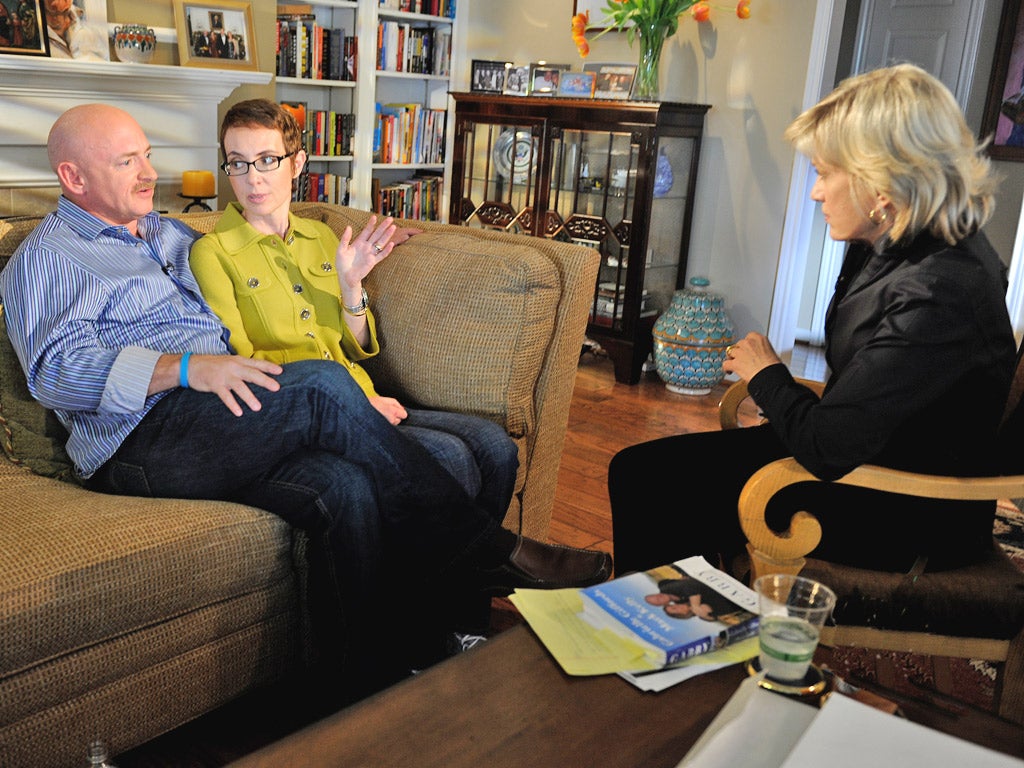US enthralled by single-word answers from politician who refused to die
Gabrielle Giffords gives her first television interview since being shot in the head

Congresswoman Gabrielle Giffords turns to her husband and calls him brave, and it's hard to disagree. Then her husband, astronaut Mark Kelly, turns back to her. "That's what I think of you too," he says. "Brave and tough."
It is his words that most express what the TV audience is thinking – but it is hers that capture the extraordinary road she has taken since she was shot outside a supermarket in her Tucson, Arizona, constituency ten months ago. If tales of human endurance and triumph over adversity is what the American television networks love best, ABC hit gold with its interview with the couple, broadcast on Monday night.
Ms Giffords is still mostly unable to speak in full sentences. But even though she is still far from a full recovery, the improvement in her health since that day has left doctors amazed.
"Better, better," Ms Giffords, seated beside her husband in a couch in Houston, Texas, where she remains in intensive therapy, tells ABC's chief news anchor, Diane Sawyer. And again, "better". This is her response after she is asked if she plans to run for Congress again. Mr Kelly expands on the answer: she has to be better before making that commitment. Supporters who have been aching for more details of the Congresswoman's condition – this is her first television interview since the January shooting that left 12 others wounded and six dead – have reason to be thrilled and sobered alike. A bullet travelled the whole length of the left side of Ms Giffords brain; some call it a medical miracle that she is alive, let alone grinning, engaging in a form of conversation and walking as well.
But there the miracles stop. Most of Ms Giffords' answers to Sawyer came in the form of single words, sometimes repeated for emphasis. Asked if she was angry when she first learned in her hospital bed what had happened the day of the attack, she replies, "No, no, no. Life, life."
Early in the interview she is asked simply how she is feeling. "Pretty good... Difficult... Strong, strong, strong," she says.
It means the uncertainty about her political future will linger for some time longer. Probably there is no politician in the US better loved than Ms Giffords, 41, and there has been speculation that instead of running for the House of Representatives again, she could seek a US Senate seat. "Yes, absolutely. She would like to run," Commander Kelly said in a separate interview yesterday. "She hasn't made the decision yet. She has some time."
The suspect in the shooting, Jared Loughner, is in custody in Missouri and undergoing medical treatment. He has pleaded not guilty to 49 charges stemming from the attack. Both the Congresswoman and her husband expressed concern that Mr Loughner, 23, may not have received adequate treatment before his rampage. "If he had received some treatment, this probably never would have happened," Commander Kelly said.
The ABC interview was accompanied by segments of a video history of Ms Giffords' recovery taken almost since its beginning by her husband. The tapes show how in the early days she struggled to respond to simple linguistic prompts and commands. At one moment she sobs with a therapist in her Houston rehabilitation hospital. "Can I tell you something? It is going to get better," her therapist says. "You've come a long way in five weeks."
Join our commenting forum
Join thought-provoking conversations, follow other Independent readers and see their replies
Comments